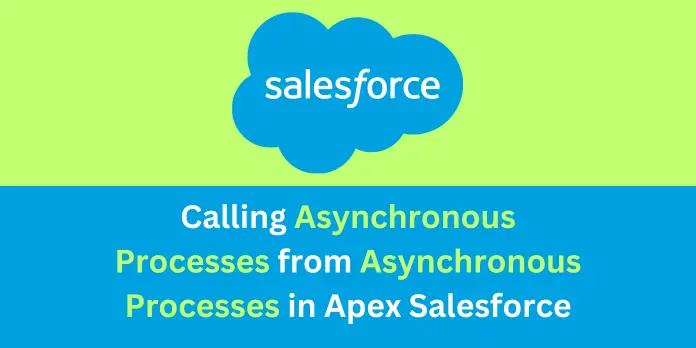Calling Asynchronous Processes from Asynchronous Processes in Apex Salesforce
Oct 16, 2023

After completing this unit, you’ll be able to:
- Introduction
- Asynchronous Processing in Apex
- Call Asynchronous Process from Asynchronous Process in Apex
- Some Examples
Introduction:
This blog post dives into the world of asynchronous processing in Apex Salesforce, specifically focusing on how to call asynchronous processes from within other asynchronous processes. You'll gain a clear understanding of the possibilities and limitations associated with this approach.
Asynchronous Processing in Apex
Asynchronous processing in Apex allows you to execute long-running tasks in the background, without blocking the main user interface or transaction. This is particularly useful for tasks that might take a significant amount of time, such as:
- Batch Apex:
- For long-running jobs with large data volumes that need to be performed in batches, such as database maintenance jobs
- For jobs that need larger query results than regular transactions allow
- Future Methods:
- When you have a long-running method and need to prevent delaying an Apex transaction
- When you make callouts to external Web services
- To segregate DML operations and bypass the mixed save DML error
- Queueable Apex:
- To start a long-running operation and get an ID for it
- To pass complex types to a job
- To chain jobs
- Scheduled Apex:
- To schedule an Apex class to run on a specific schedule
Call Asynchronous Process from Asynchronous Process in Apex
| S.No. | From (Calling Process) | To (Called Process) | Supported? |
| 1. | Batch (Start Method) | Batch | No |
| 2. | Batch (Execute Method) | Batch | No |
| 3. | Batch (Finish Method) | Batch | Yes |
| 4. | Batch (Start Method) | Queue | Yes |
| 5. | Batch (Execute Method) | Queue | Yes |
| 6. | Batch (Finish Method) | Queue | Yes |
| 7. | Batch (Start Method) | Future | No |
| 8. | Batch (Execute Method) | Future | No |
| 9. | Batch (Finish Method) | Future | No |
| 10. | Batch (Start Method) | Schedule | Yes |
| 11. | Batch (Execute Method) | Schedule | Yes |
| 12. | Batch (Finish Method) | Schedule | Yes |
| 13. | Future | Future | No |
| 14. | Future | Batch | No |
| 15. | Future | Queue | Yes |
| 16. | Future | Schedule | Yes |
| 17. | Queue | Queue | Yes |
| 18. | Queue | Batch | Yes |
| 19. | Queue | Future | Yes |
| 20. | Queue | Schedule | Yes |
| 21. | Schedule | Schedule | Yes |
| 22. | Schedule | Batch | Yes |
| 23. | Schedule | Future | Yes |
| 24. | Schedule | Queue | Yes |
Some Examples:
1. Calling Batch Class from Batch(Start Method):
Batch Class 1:
public class BatchClassTest1 implements DataBase.Batchable<sObject> {public Database.QueryLocator start(Database.BatchableContext bc) {System.debug('BatchClassTest1 start called.');//batch callingDataBase.executeBatch(new BatchClassTest2());String accountQuery = 'SELECT Id, Name FROM Account LIMIT 1';return Database.getQueryLocator(accountQuery);}public void execute(Database.BatchableContext bc, List<Child_Object__c> childs) {System.debug('BatchClassTest1 execute called.');}public void finish(Database.BatchableContext bc) {System.debug('BatchClassTest1 finish called.');}}
BatchClass 2:
public class BatchClassTest2 implements DataBase.Batchable<sObject> {public Database.QueryLocator start(Database.BatchableContext bc) {System.debug('BatchClassTest2 start called.');String accountQuery = 'SELECT Id, Name FROM Account LIMIT 1';return Database.getQueryLocator(accountQuery);}public void execute(Database.BatchableContext bc, List<Child_Object__c> childs) {System.debug('BatchClassTest2 execute called.');}public void finish(Database.BatchableContext bc) {System.debug('BatchClassTest2 finish called.');}}
2. Calling Queue Class from Future Method:
Future Class:
public class FutureTest1 {@futurepublic static void testFutureMethod1() {System.debug('testFutureMethod1 called.');//queue callingSystem.enqueueJob(new QueueTest1());}}Queue Class:public class QueueTest1 implements Queueable {public void execute(QueueableContext qc) {System.debug('QueueTest1 execute called.');}}
3. Calling Batch Class from Queue Class:
Queue Class:
public class QueueTest2 implements Queueable {public void execute(QueueableContext qc) {System.debug('QueueTest2 execute called.');//batch callingDataBase.executeBatch(new BatchClassTest3());}}
Batch Class:
public class BatchClassTest3 implements DataBase.Batchable<sObject> {public Database.QueryLocator start(Database.BatchableContext bc) {System.debug('BatchClassTest3 start called.');String accountQuery = 'SELECT Id, Name FROM Account LIMIT 1';return Database.getQueryLocator(accountQuery);}public void execute(Database.BatchableContext bc, List<Child_Object__c> childs) {System.debug('BatchClassTest3 execute called.');}public void finish(Database.BatchableContext bc) {System.debug('BatchClassTest3 finish called.');}}
When we execute "System.enqueueJob(new QueueTest2());" from an anonymous window, then the BatchClassTest3 class can be called.
4. Calling Future Method from Schedule Class:
Schedule Class:
global class ScheduleTest1 implements Schedulable {global void execute(SchedulableContext SC) {System.debug('ScheduleTest1 execute called.');// Future method callingFutureTest2.testFutureMethod2();}}
Future Method:
public class FutureTest2 {@futurepublic static void testFutureMethod2() {System.debug('testFutureMethod2 called.');}}
When we execute "System.schedule('Test Job', '0 32 13 15 10 ? 2024', new ScheduleTest1());" from an anonymous window, then the FutureTest2 class can be called.
Note:- Customized CRON expression according to you.